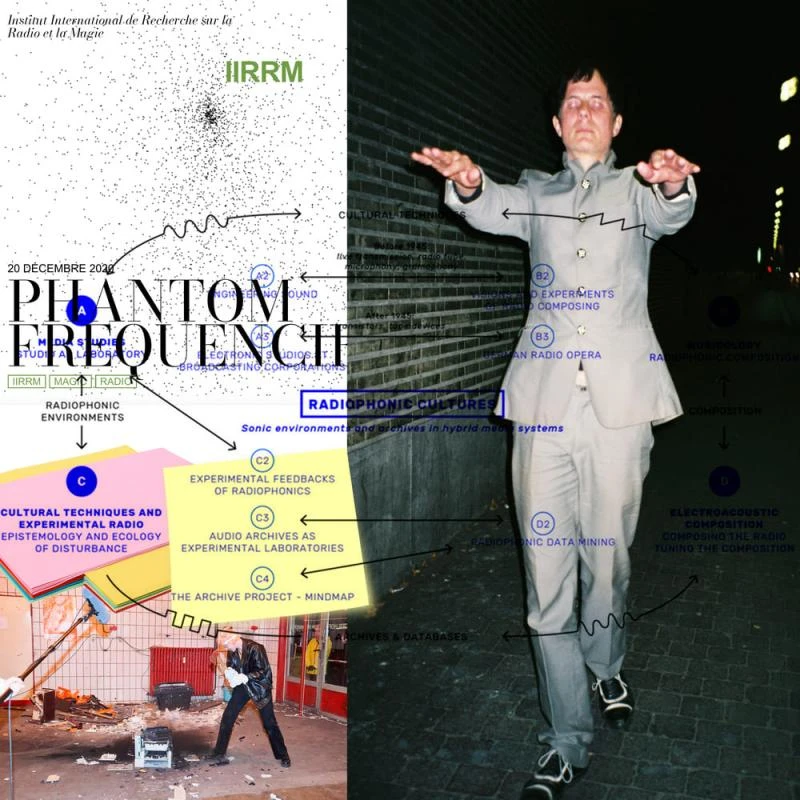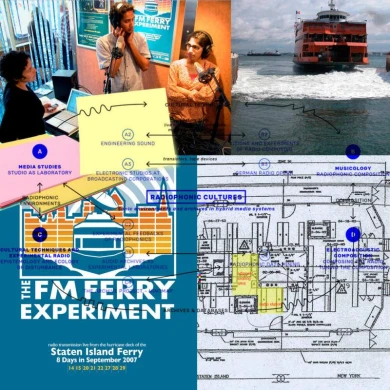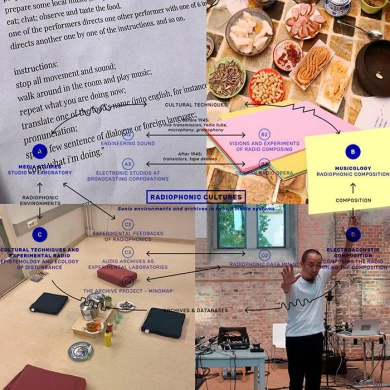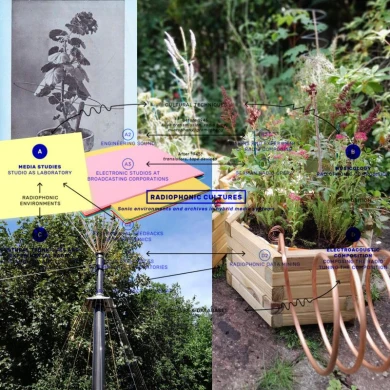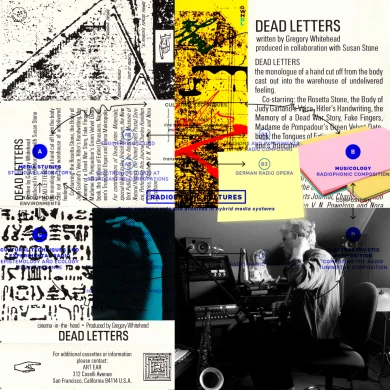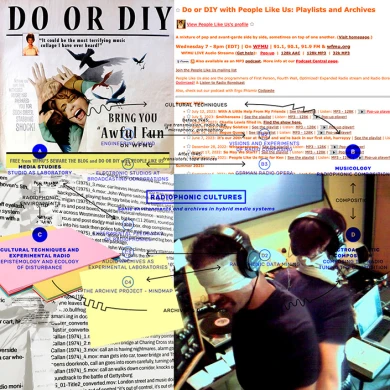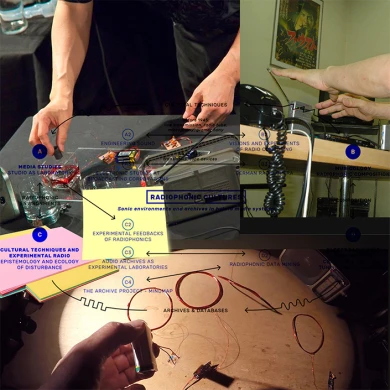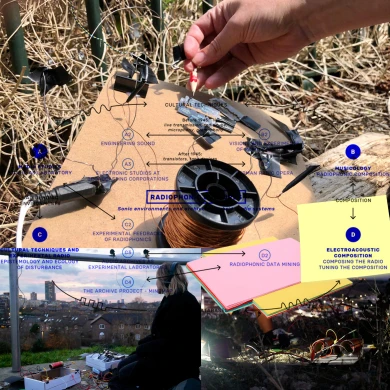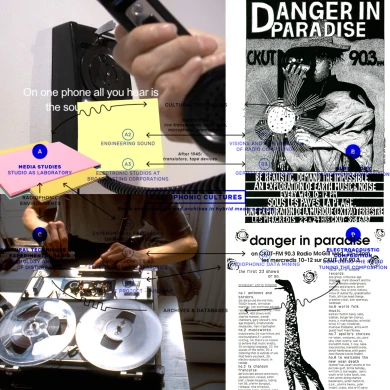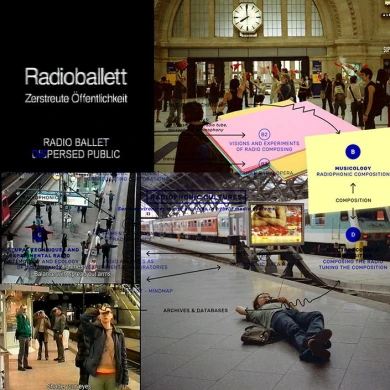[Sounds from Phantom Frequencies]
My name is Felix Kubin. I'm a composer, a performer, a media artist and a creator of radio plays (in German, hörspiel). Also, I'm using radio for all kinds of experimentation.
[Clip from Phantom Frequencies]:
“(Sounds)
—It sounds that is coming out of the blue. I don’t know where they are coming from. There’s nothing playing here. I haven’t hooked up to this. It’s not defined, making interesting wave forms…
—Yeah, I mean…”
My work in relation to radio focuses on two different fields. One is radio in real-time, which means all kinds of radio experiments that maybe include also listeners or certain experiments whose results you never know in the beginning, and that you are conducting via radio and in the radio. These are mostly happening at festivals, radio festivals, like Radio Revolten or Radio Art Zone, but also at our own festival, that I run together with two friends in Hamburg called Papiripar, which once we had to turn completely into a radio festival because of the COVID-19 lockdowns. And then, we would use the radio also as a canvas for experiments.
The other, for me, also economically more important part, is creating radio plays (hörspiel, as we call them in Germany) and writing them, producing them, making recordings for them, and composing music for them. This is also what I really like about radio plays: that they actually combine a lot of different elements. And I like to create Foley sounds, or to create sounds that are not existing in this world.
I have made different kinds of formats for radio. I created a format together with a friend called Demo Dandies, where we always work with a local radio station and we go to a place to DJ, but we don't DJ our own music. We only DJ the music that the audience brings us. So, we play demos of the audience, and this is transferred live to a radio station. Sometimes we also conduct live interviews with people from the audience, so the audience is basically listening to its own creative output.
[Clip from Demo Dandies #1]:
“—Hello, Natalie. Are you ready to interview me now?
—Yes, I'm ready. What is it that makes music?
—Well, music is really something that gives you feelings. Music can be anything, really anything, even any noise. Here's an example of music. (Drum sounds) Right, does that answer your question, Natalie?
—Yes.
—Now, next question, please.
—What is it that makes music different to noise?
—Noise is just all banging and everything like… (Drum sounds). That's noise but music's like a rhythm… (Drum sounds).”
Another really nice format that happened on the festival that I mentioned — that I created together with two friends called Papiripar — was a format called the Call Centre for Destruction where we asked listeners to destroy objects that they love or hate at home and transfer this via telephone. And I also made some kind of documentary or collage out of several of these destructions for the Austrian radio, the Art Radio.
[Sounds from Call Centre for Destruction]
Another thing that is linked to the hörspiel, and radio play topic, is a sort of live presentation of radio plays, live performances. They are somewhere between a lecture-performance and playback of the radio. I start to also talk to voices in the radio live on stage, and I play the answers from the computer. I add certain sounds to already existing parts of the radio play live. And that's for me a way how to bring the radio play on stage without falling too much into a category of just a concert or just a lecture. I like to find something in between there. And there's a few radio plays that I turned into live radio play performances, like my, for example, Paralektronoia or Phantom Frequencies radio play, which I will talk about a little bit later on.
[Clip from Radio Gagarin]
I also produced radio shows for a local uncommercial radio station in Hamburg. I started that in the 90s with two friends and we called it Radio Gagarin, because we imagined that this would be a radio program created by Juri Gagarin, the first cosmonaut in space, who orbited around the earth in 1961. And we imagined that he just stayed up there in the orbit and lost his mind and started to create these strange programs in a demented state, but with a plan. And there's also a record label that I founded after that called Gagarin Records, and this relates actually to the radio program that I created before.
[Clip from Radio Gagarin]
Radio has played a very important role in my life already when I was really young. There were always at least three radios running in different rooms, different stations. So, instead of switching the program on the radio, I could just go from the bathroom to the room where I lived with my brother, or to the living room of my parents, or to the kitchen. There would always be another radio running in these rooms, sometimes these stations would also be the same so that you could hear a certain echo going from one room to another. The radio was on all the time, actually.
Most important for me was the education I got, and this was in the end of the 70s and beginning of the 80s, especially brilliant for music, for underground music. There were a few radio personalities, or let's say moderators, who would provide the listeners, especially the young listeners, already in afternoon programs, let's say around one o'clock, two o'clock, with a very bizarre underground music.
[Clip from Mark of the Mole by The Residents plays in the background]
I'm talking here about, let's say, the music of the genius dilettantes like Tödliche Doris, who would talk about deadly accidents in a household, or something like Mark of the Mole, which was like a fairy tale for grown-ups with very bizarre music by the group The Residents. And of course, radio plays (hörspiel).
[Clip from Das Ohrenlicht by Ronald Steckel plays in the background]
When I was 15, my uncle from Switzerland sent me a radio play that he recorded there, and that was Das Ohrenlicht by Ronald Steckel. It was in 1984, so it was a radio play that referred very much to technology. It was about artificial intelligence, which could also have been intelligence from another planet, an alien, so to say. But I always saw it like an artificial intelligence of a computer that interviews me as a listener or listens to my listening and tries to telepathically trigger my senses by inventing these virtual rooms in which sometimes fascinating, sometimes scary things… Sound collages would happen that this intelligence invented in order to find out what the listening actually means, what listening is and what it means that I have, as a higher intelligence, created this artificial intelligence. So this intelligence starts to philosophise if there might be also a higher intelligence above me that created me.
I listened to this radio play many times, also because I didn't completely understand it. I think it's also not made to be completely understood, but I was so fascinated by the form, by the sound. They used a technique called Jecklin stereophony with a plate, which divides the left and right channel, so you have a very extreme spatial sound when you listen to it under the headphone, nearly like an artificial head. I don't know what it's called in English, Kunstkopf in German. In English, I think it's called “binocular recording”.
This was so fascinating, and also the transition between sound and music, and the artificiality of the rooms that were created, the intensity of the voices that were also treated with certain sound effects so that sometimes they came from something like a very plain reflecting room that didn't sound like a normal room that you would step into. They sounded like an artificial room. All of this made me, planted the seed in me that I would like to create something like this later on, as a profession.
[Clip from “Confusions of Tongues”, in the album The Pleasure of Ruins, by Gregory Whitehead]
I had some epiphanies. One was this one with Ronald Steckel. Another one, for sure, was when I discovered the works of Gregory Whitehead, a CD I bought with a pretty ugly cover, but it's absolutely fantastic. It's called The Pleasure of Ruins, where he uses only the human voice, his own voice, I guess, that he also turns into very different kinds of voices.
He uses cut-up techniques, and he plays in a very intelligent way with the meaning, but also the sound of words. He always manages to open a little bit the room to the uneasy, to the eerie, to the subconscious. That's something I found really fascinating.
[Clip from Komplex 10 by Gerhard Rühm plays in the background]
I also liked very much the works of Gerhard Rühm. He was also just working with a voice in order to create something like musical compositions with repetitions and, rhythmizing the texts. This is also something that I found really fascinating.
For me, radio has always been something holy, and I think this is because it was always there when I was lonely. And there were moments where I was quite by myself, quite lonely. That's also why I enjoyed creating music by myself. I wasn't a lonely person in general, but there were moments where I felt a bit, let's say, apart from the others. And I liked to create things myself, and radio was always there for me to get new information about fascinating music, about exciting stories, or just about scientific topics and so on. I just feel like it was always enveloping me. And that's the feeling I still have with acoustics.
The great thing is that you don't need to focus on them with your eyes. It's not like a television where you have to look at. You can just move your head around and it fills the room. It's around you. It's something like a sphere. That's what I really like about it. And that's maybe also the reason why I also saw something supernatural in it, and I found out that there's a lot of connections to occultism and media history.
[Clip from Phantom Frequencies]:
“4. Tape Art-effects
From the digital eras we move to analog tape. Tapes that lie around for a long time tend to suffer from print-through, cross-talking or odd magnetization effects. Here are a few examples, starting with a sound that suddenly appeared at the end of a very old audio cassette. I will play the sound twice. (Beeping sound).”
I grew up with a mother that was very special in the way that she perceived the world because she has a softer form of schizophrenia and paranoia. And for some reason, I started to make connections between her and the radio itself. I found also literature about this, for example, the experiments that happened in seances, often seemed to me like pre-technical setups of radio receiving or receiving messages, information. And I started to make research about this. I wanted to make a radio play where I wanted to create assumed connections between paranoia and electricity. Because I found out that there were quite a lot of musicians or technicians who were working in this realm, who I think at least touched this area of paranoia, not in a pathological way necessarily, but in an aesthetic way.
And while I did this, on my research I went really deep into this idea, that the human could be like a radio receiver and the fingers can be the antenna. It's also because my mother actually said to me, also when I interviewed her about this, that she sometimes feels like an antenna that you can focus on and which reacts. She saw herself like a receiver, and I found this also in the writings of Daniel Schreber. He wrote a book because he was institutionalised. He was in mental hospitals for quite a long time, 14 years, and he wrote this really fascinating book about himself, feeling like receiving information and like someone who receives waves and turns into waves. There are a lot of other very interesting subjects here in his book, but basically he created some kind of modern media philosophy, but from the perspective of someone who would be called a mentally ill person.
I went to New York because I wanted to meet Alvin Lucier for my radio play Paralektronoia.
[Clip from Paralektronoia]:
“—Welcome, my name is Alvin Lucier. I am the director of this institute.
—(Distorted voice) Welcome, my name is Alvin Lucier. I am the director of this institute.
(...)”
And I also had an interview with a guy called Stefan Andriopoulos, which was really striking for me, because Andriopoulos explained that he was a professor or teacher of media history and occultism. He explained to me that a lot of the terminology that we use for radio or for technology in general comes from occultism. Starting with the word “medium”, we say the medium is the message, or we use a certain medium for information and for spreading audio or TV or whatever images. And medium is, of course, the word of the medium in a seance that receives the information and channels it. Here's another word: “channeling”, the channel that we choose for TV or something, channeling it to the people who take part in this seance. The television is nothing else than the magic mirror.
And there's this beautiful German word, Ferngesicht, the distant face. The distant face is a face that we receive from another part of the world or even outside of this world, maybe, from the world of the dead. And this face comes to us and speaks to us. All these things have been realised later on by technologies. And now people walk through the streets, and they look into the magic mirror, their phones, maybe Facetiming with someone, and they have the Ferngesicht in front of them and they talk to it. Also, when people walk in the streets and they have their headsets on, you could assume that they are schizophrenic because they talk to someone who's not there. They pass by you, and they talk, and you might think that they talk to you, but actually they're just having a phone call with someone and you can't see the headphones. Also, this can be seen from a pathological point of view, and I think that the fact that we can constantly be at another point with our mind, somewhere in the data world, this really changes our perception of reality. We are constantly beyond reality because we are constantly connected to another location, to another frequency.
[Clip from Phantom Frequencies]:
“3. Digital errors
The digital domain is full of little glitches, skips and viruses. Here is an example of what a Chinese computer virus can do to a sound file. (Interference sounds).”
I have basically three radio plays that touch the idea of the phantom and of transmission. That is the radio play Phantom Frequencies and Phantomspeisung and Paralektronoia. The oldest one, Paralektronoia, I talked about already a little bit, this is a radio play about the connections between ghosts and electricity. I asked a bunch of people, scientists, musicians, researchers, what the connection between ghosts and electricity could be, and what they assume, what the connections are, what is the presence of a room, for example. And I invented a little story around that, which is that an alter ego of mine, Felix Kubin. He has a disturbance in the ear, which could be something like a tinnitus, so like a hörsturz, and he tries to find out about this phenomenon by entering the Paralektronic Institute.
[Clip from Paralektronoia]
The other radio play, Phantomspeisung, is a radio play about the microphone, the device that is usually used to turn the movement of air into electronic signals. The microphone that is supposed not to be in the image. May it be the visual image, the literal image, or just the image, let's say, of an acoustic event. So, the microphone is never the topic, but I made it the main topic of this radio play because I think on a certain level, the microphone is the door between life and death. Everything that is recorded and turned into sound waves that can be stored digitally is frozen there. So, in a way, it's not alive anymore. And you can just listen to it whenever you want. You can listen to the voice of your parents even if they are dead already.
This brings a lot of eerie moments with it. We know this effect that some people still have their voice on an answering machine, although they are already dead. Or, I just recently had it with my nephew, who has a deep voice now, but he still has his voice before the voice break or voice crack on his answering machine. And this is very bizarre, I think, because it suddenly takes an element from another time, and confronts me with an absurdity that doesn't fit to the presence anymore.
[Clip from Phantomspeisung]
In this radio play I also wanted to see what happens when I destroy different microphones, and what it does to the listener. Because the microphone becomes the ear of the listener in this radio play, so the listener must have this feeling that someone is starting to destroy his ear or to harm himself.
Phantom Frequencies is the third radio play where I asked lots of friends if they, by accident, have any recording on a medium, like a data medium, which could be an audio cassette or a videotape, or on the computer, where suddenly a sound popped up, appeared from nothingness, which they have no idea how it got there.
[Clip from Phantom Frequencies]:
“Welcome to Phantom Frequencies. Dear listeners, the recordings you are about to hear cannot be trusted. They were made unintentionally or occurred without any human interaction. Some of them, like electromagnetic interferences, can be explained scientifically. Others can't. What connects all of them is their unexpected appearance. These sounds emerged from nothingness, like phantoms. They manifested on old tapes, online streaming channels, disrupted hard disks and broken studio gear, recordings played at the wrong speed or accidentally contaminated by outer signal interferences. The phantom sounds I'm going to play to you are classified as: accidental recordings, undefinable sounds, digital errors, tape artifacts, electromagnetic interferences.”
It can be a disturbance in the air, let's say, something that a magnetic field that disturbed the tape and created a sound on it or something. Some disturbance in cables, or it could be something that they accidentally recorded, I left this open. For me, these were like phantoms of sounds that appeared on the tape or on the medium. And there were a lot of really fascinating sounds, actually some were pretty eerie, and very hard to explain how they came to existence. Of course, there must be a lot of scientific explanations, but I put all of these recordings and findings into a program that was imitating something like a BBC scientific radio program or just a documentary, documenting these different findings. These three radio plays are all using phantom as a topic.
[Sounds from Phantom Frequencies]
These viruses or these phantoms or disturbances that appear suddenly from nothingness, I find very interesting. I also think that these disturbances are very interesting in the process of creation and the process of recording. I find it absolutely amazing, that I'm living in a time where I can record my voice and listen to it, because that wasn't possible before. You could only guess what your voice sounds like, but everyone knows the shock that we have when we listen for the first time to a recording of our voice. We think: “this is not our voice”, which also says a lot about the recording process.
Or course, it has to do with the fact that we perceive our voices inside our resonating bodies when we talk, so we have a different perception of the sound. But it also means that, as soon as words are leaving our mouth, they are still traveling through the air and they are existing, but they are not part of our body anymore. So, whose are these spoken words as soon as we created these words? Who do they belong to?
And when we record them, we can put a patent on them. We can say now they are fixed, and these are obviously our own voices, so they belong to us, and we have a copyright to them. But with nowadays techniques of analysing and imitating voices or any kind of sound, even music, this ownership will become obsolete, I think. Will be very difficult.
We are back in the times when we couldn't catch a word that leaves our mouth, catch it, phrase it, and say: “now it's there as a data file; now this is mine”. Because it can be imitated, and it can be doubled, and it can be transformed. It can be used to create other words, and I find this really fascinating. This kind of elusiveness of our own voice, our own words. As soon as our voice is conserved, then it belongs already to the past. It's already in the realm of the dead, I think.
[Clip from Phantom Frequencies]:
“6. Voices
In the last category, I gathered some unusual voice recordings. The first two of them are hard to pin down concerning their nature. Humans? Animals? Aliens? (Raspy breathing).”
Radio is now more and more existing as an archive. It lost one of its most precious goods or features, which is the linearity of time. In the past, before things were stored, we had to listen to a radio broadcast at a certain time. This was like an appointment, and it also meant something that we have to commit to. And we also knew that everyone else would listen to this at the very same time, so we shared the same listening experience. That's why I still really like to listen to radio works in a collective, in a cinema, for example, or any kind. Or in a room together with other people, because it means that we are listening simultaneously to the same thing, and there's a linearity to it; there's a start and an end.
The digitalization and the disappearance of the analogue radio, means both the disappearance of waves that travel through the air, at least this kind of waves which, with a very simple technical device, could even be built by people who are not like extremely knowledgeable about technology. You could catch these airs, and you could listen to them, these airwaves, and I really like that. This disappears, and the linearity disappears so, in a way, we are not listening to something that is alive. We are listening to something that is, if not dead, then let's say frozen.
[Sounds from Phantom Frequencies plays in the background]
An archive is also something beautiful. I mean, a library is a nice archive, and I like to be there, and I like to be in this contemplation there. But again, a library is a public space where many people go to. Now, we have all access to everything immediately and we have access as an archive. And we can decide if we want to listen to a whole program in its entirety or not; if we want to listen just to the first 30 seconds, if we want to re-listen to them and so on. We have a total verfügbarkeit, we have a total access, and we have in our own hands and power if we want, and how we want to listen.
And what I liked about the linear radio was that we had to commit to it. We could only listen within a certain time frame, and if we didn't understand something, then it was lost. Of course, we could record something, and we would do that a lot with a tape. Then we would re-listen to the tape, of course. But still, the basic understanding of radio was that you have to be there at a certain time. Like we had to run from school home in time to catch the interesting radio shows where we would learn about new underground music.
The linearity of time is also something that has to do with our own lives. We cannot rewind anything in our life. And also, we cannot jump into the future in order to know what it will be like then and then. All our emotions are linked to the very moment, and to decisions we make. And this decision can be to cross the street at the wrong moment, and then to be hit by a car, and that's it. But that's also what makes life unique and, somehow, I would say liveable. The content is only happening in the present.
So maybe in a certain way, radio as I did understand it in the past, doesn't exist anymore or will soon not exist anymore. The only thing that comes close to it could be a live event, a live performance, a live concert that I see.
[Clip from Phantom Frequencies]:
“Just follow me. (Footsteps). The closer I come to the flat, the louder the signal. (Door sounds). Now I'm entering the door. And here we are. (Interference sounds).”
When we turned our festival Papiripar into a radio festival, we decided not to archive the recordings so that people could just say: “I will listen to it later on”. No, they were forced to listen to it, or it would be gone. And I found this very important because I wanted to recreate the moment that you might miss something or that something is really, really live.
Because of the lockdown, at that time when we did this, many people started to listen to the radio permanently. They left the radio on. They couldn't meet anyone, and they said it gave them a lot of… they were really comforted by this. And it was something to help them not to feel so lonely and isolated. And I think this was really beautiful. That's also why I think a lot of people were taking part in these programs where you had to call in and destroy an object or play a duo with your home instrument with another person that was also calling the radio station. And then you had a flute player and a piano player, and they tried to play together, listening to the radio with all the time delays, time lags, so that the result would always be a little bit out of synchronicity.
[Clip from Phantom Frequencies]:
“(Sounds). We will become antennas. We will send and receive at the same time. Maybe the time linearity will not function the way we are used to it anymore. We will not be an archive. We will be a living organism, which will both produce and receive information at the same time. (Sounds). We will be like an electric field that has a certain charge, or maybe many different charges that are constantly moving and becoming stronger and softer. (Sounds). But we will be able to pick from this charge, and create live radio plays, just with our imagination. And we will be able to telepathically transmit this information. It will be some kind of electromagnetic transmission. Like in this radio play, Das Ohrenlicht, we will be able to compose with voices, sounds and music, just by the power of our thoughts, which will be picking charges and certain polarities from this electric field to which we are all subject to. But because of the differences of our individualities, we will turn it into different results. This is like an ongoing radio drama, and an ongoing radio show that we are all connected to.
[Sounds plays in the background]
(We will not be able to discern anymore between us and the world. We will not know if we are dreaming, or if we are awake. Maybe even if we are alive, or if we are dead.)
[Sounds plays in the background]:
“And finally, a midnight recording of a small park in a Spanish village. Nobody knows what happened there. Do you have an idea?”
